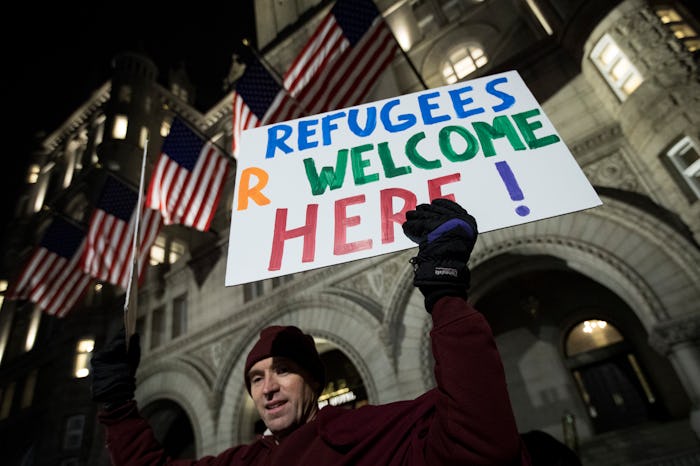News

Is This The End Of Trump's Travel Ban?
On Sunday, a federal court informed Donald Trump's administration that, no, it would not reinstate the president's controversial ban on refugees and travel from some Muslim-majority countries. It's a huge victory for the civil rights activists who have fervently protested against and fought the ban in court since it was implemented via executive order last week — because, for now at least, Trump's travel ban is over. A lower court had previously ruled it unconstitutional and temporarily opened the country's borders back up to travelers from the seven affected countries and refugees. But Trump and his team will surely continue to fight to turn them away once again in the name of "national security."
And that legal battle will resume very soon. The Department of Justice, which is representing Trump, filed an emergency motion urging for the reimplementation of the ban after a district James L. Robart of Seattle suspended it nationwide in an unusual move Friday. So, at least until Monday, travelers and other immigrants from Syria, Iraq, Iran, Sudan, Somalia, Yemen, and Libya will be able to enter the United States — as the crowds who flocked to airports across the country after the ban's Jan. 27 announcement protested passionately for their right to do. That's because the 9th Circuit Court declined the Justice Department's request, instead instructing both the law's legal challengers and its defenders to file an official response and counter response, respectively, by Monday, according to The Washington Post.
From there, the next phase of the fight will commence. Affected travelers will be permitted to reach their American destinations until at least Monday, but the future prospects of others like them — and of the ban itself — are still very much unclear. Trump, for his part, transmitted his displeasure with Robart's initial ruling in favor of attorneys for the states of Washington and Minnesota, who wanted him to cease the implementation of the most inflammatory aspects of his executive order, via Twitter. He blasted Robart as a "so-called judge" and lamented his own incorrect belief that "anyone, even with bad intentions" can enter the United States. In fact, the government already employs an extensive vetting procedure before admitting refugees and immigrants.
The initial ban proved a logistical nightmare at travel hubs throughout the United States as officials set about trying to enforce it with little warning. Legal permanent residents and refugee newcomers alike were detained for hours after landing, and families who has been anticipating a reunion suddenly did not know when they would see one another again. Between 60,000 and 100,000 green cards were revoked, until Robarts ordered them reinstated. On Saturday, it was announced that an Iranian 4-month-old whose planned trip to Portland for a life-saving heart surgery had been disturbed would be permitted to enter the country — but only after the Trump administration granted her family a waiver to do so.
Perhaps this type of situation — not to mention the disregard for humanitarian responsibilities — that promoted Vermont Sen. Patrick J. Leahy to condemn Trump's ban and his reaction to the courtroom challenges. "The president's hostility toward the rule of law is not just embarrassing, it is dangerous," he said in a statement, the Post reported.
Critics believe that the move amounted to a fulfilling of Trump's campaign musings about barring Muslim immigrants from coming to the United States. But the Trump administration continues to insist that it is targeting the seven countries with mostly Muslim populations (and even going so far as to pledge preference to religious minorities in those nations) solely in order to protect Americans from radical Islamic terrorism. In a brief submitted in court, the Department of Justice argues that Robart's ruling "second-guesses the the President's national security judgment," according to NBC News, and that:
Unlike the President, courts do not have access to classified information about the threat posed by terrorist organizations operating in particular nations, the efforts of those organizations to infiltrate the United States, or gaps in the vetting process.
Much of the country is questioning Trump's judgment in this case (and many, many others), though. The fact that no national of any of the included countries has ever carried out a deadly attack on the United States is striking, as is the fact that that counties where Trump has business interests — including Saudi Arabia, which was home to most of the terrorists behind the 9/11 attacks — are exempt from the measures purportedly put into place to keep Americans safe.
All of this will surely be hashed out in court over the coming weeks or months. At the end of the legal battle, if all goes the way it should, refugees and immigrants who pose no threat to national security will be able to make their homes here without fear.